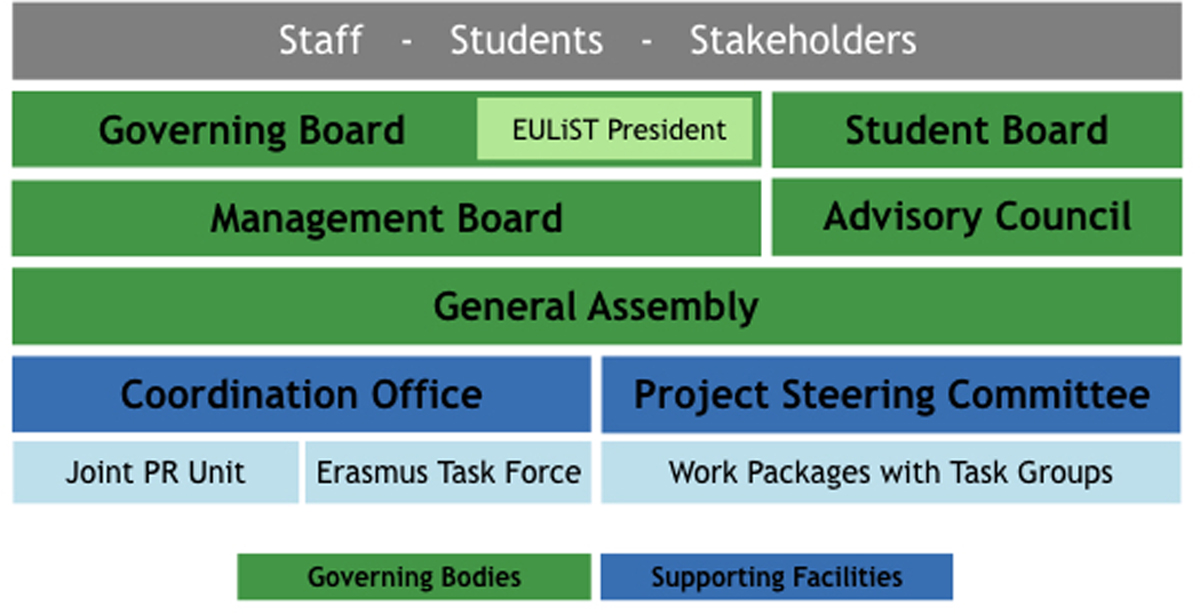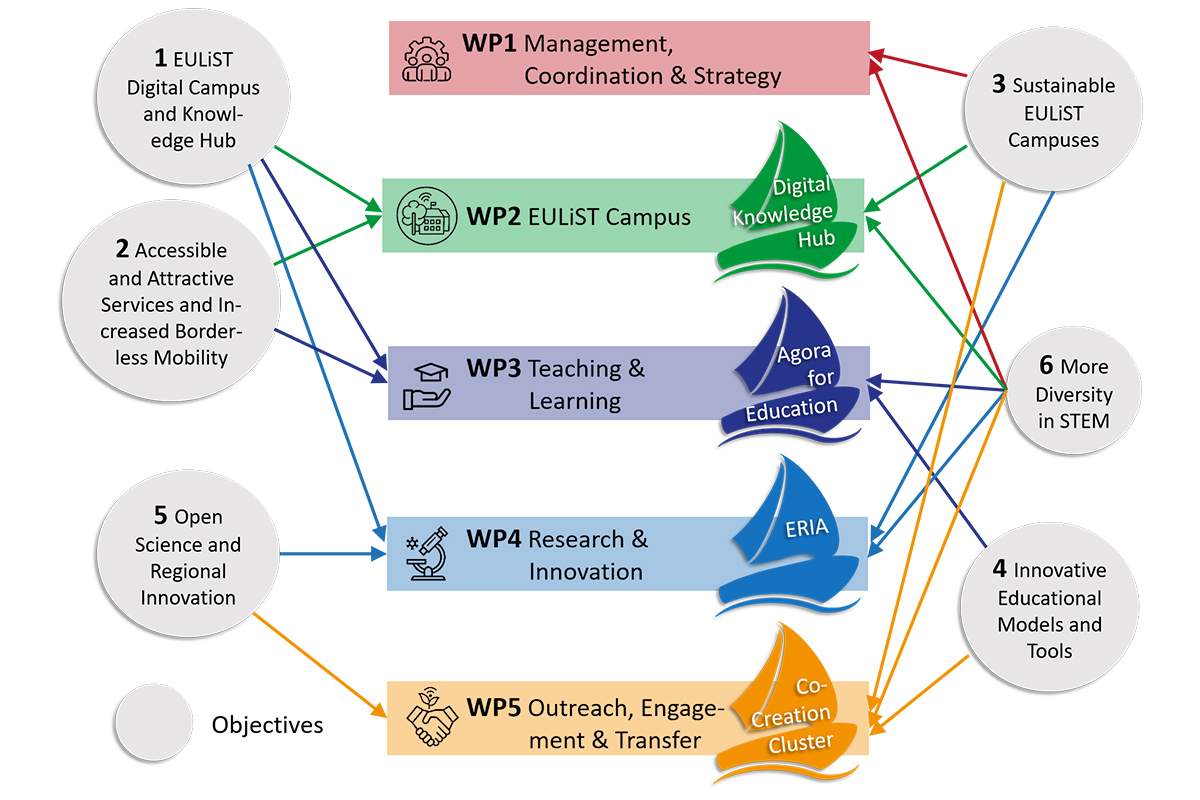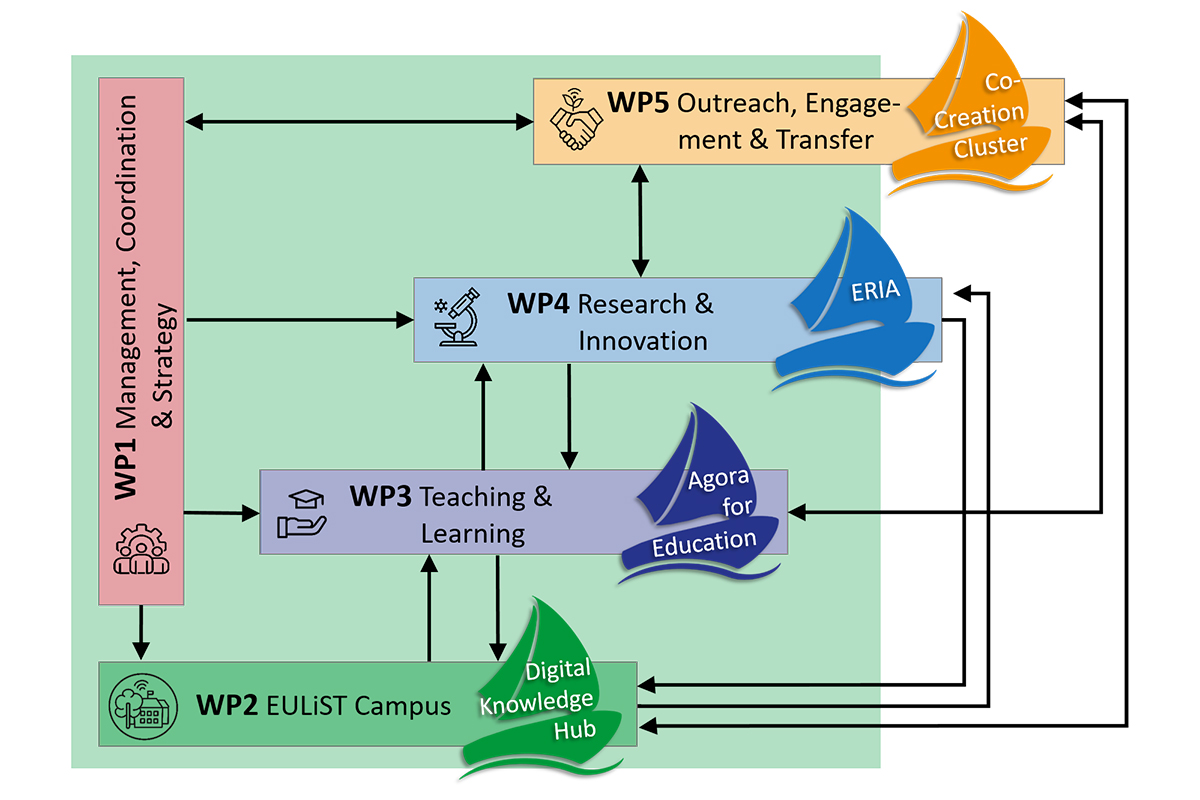Connecting academia and society through dialogue – Leibniz University Hannover has taken up this challenge in cooperation with nine partner universities in Europe. The EULiST – European Universities Linking Society and Technology alliance aims to bring the European experience to life for all students and university members. Together with our EULiST partners, we intend to make our vision of a European university a reality – through cooperation in the context of studies, research and administration. Strong partners and close networks ensure our future competitiveness in the international realm.
Background information
-
What are European universities?
In 2018, the European Commission launched the European Universities Initiative in order to modernise higher education in Europe in a comprehensive and sustainable manner. European universities are transnational university alliances that aim to develop a joint European educational area. As “universities of the future”, they deliver excellent education and research, promote sustainability and strengthen the European identity.
The initiative’s objectives are as follows:
- Fostering and strengthening the European idea
- Promoting the performance and competitiveness of the European higher education system by significantly increasing and improving the quality, performance and appeal of universities in Europe
- Bringing together a new generation of Europeans which promotes shared values and a European identity
-
On the path to becoming a European university
In 2020, Leibniz University Hannover initiated the EULiST – European Universities Linking Society and Technology alliance. EULiST brings together ten partner universities with complementary strengths in technical subjects, the humanities and social sciences. Through joint and integrated approaches in the social and natural sciences and engineering, we aim to develop sustainable solutions to the major societal challenges facing us today and in the future. To achieve this goal, we are developing innovative educational opportunities and an inter-university campus which will bring together teaching staff, students, researchers and administrative staff and promote exchanges within the European university alliance.
Objectives
The EULiST objectives are as inspiring and they are diverse:
- We want to educate a generation of European citizens who are multilingual, socially responsible and able to build bridges between academia and society.
- Our vision is to create a physical and virtual European EULiST campus characterised by diversity, inclusion and sustainability.
- We aim to develop innovative, flexible and interactive teaching formats and curricula that sustainably integrate cutting-edge research.
- We want to bring together international teams made up of students, researchers and regional actors to develop sustainable solutions to societal challenges.
- We would like to build a cooperative knowledge and transfer network that supports results-oriented research, innovation and evidence-based policy development.
We have already identified thematic synergies and focal areas that focus on the following five Sustainable Development Goals of the United Nations:
- SDG 4 - High-quality education
- SDG 6 - Clean water and sanitation
- SDG 7 - Affordable and clean energy
- SDG 9 - Industry, innovation and infrastructure
- SDG 11 - Sustainable cities and communities
- SDG 13 - Climate action
But this is just the beginning! We are open to cooperation and joint activities in other interesting thematic areas. In keeping with Leibniz University Hannover’s motto – “The spirit of Leibniz!” – let’s shape the future together!
Work packages
-
Management, coordination and strategy (WP1)
In Work Package 1, the EULiST alliance’s work is centrally managed and coordinated.
A governance structure is being developed as part of this package to ensure the efficient and sustainable administration of the alliance. This structure oversees and secures the transparent, goal-oriented and timely completion of all tasks as well as an optimised communications strategy within the alliance.
The following activities are being carried out as part of Work Package 1:
- Student engagement: Securing of active participation and inclusion of students in the alliance’s governing bodies via the Student Board.
- External income: Development of a strategy and a joint action plan for the integration of European, national and local funding sources to ensure the sustainability of the network via additional funding.
- Quality assurance: Execution of quality-assurance measures and monitoring for ongoing improvement and innovation in order to strengthen and improve the quality of education, research and societal participation within the EULiST alliance.
- Strategy for the sustainable development goals (SDGs): Organisation of sustainable development practices within the alliance in order to develop, promote and monitor sustainable policies and contribute to the realisation of the SDGs in Europe and beyond.
- Inclusion and diversity: Promotion of a supportive learning and work culture which works to promote the same career chances and opportunities for people of different genders and from different backgrounds, as well as measures to increase the number of women and achieve balanced gender representation in the STEM degree programmes.
-
EULiST campus (WP 2)
Work Package 2 focuses on the vision of an interactive, sustainable and overarching campus for the alliance.
The following activities are being carried out as part of this work package:
- Digital campus infrastructure: Linking of the EULiST community via a user-friendly digital infrastructure for education, research, and communications work which includes an integrated learning management system, a system for student enrolment and a regular flow of information about EULiST activities, as well as access to the EULiST knowledge centre and the academic support centre.
- Open-data knowledge hub: A digital centre containing a directory of open-science data, guidelines and resources in order to enable access to and exchange of knowledge and data generated by EULiST members and to support local interest groups in using research findings and innovations. This will facilitate the comprehensive management of research data over the entire life cycle.
- Library knowledge hub: A unique digital information centre and a central point of access where EULiST members can maintain, coordinate, combine, share, update and expand their own library and knowledge systems in order to support open science and bring together open access collections, data centres and services within one platform.
- Campus sustainability initiative: A joint model and physical sustainability demonstrators (available to everyone via a digital platform) for measuring and analysing the carbon dioxide footprint at each EULiST campus in order to identify best practices that can be shared within and beyond the alliance.
- Academic support centre: Promotion of cooperation and exchange regarding best practices, initiatives and resources among those staff members responsible for supporting students and academics, including support services for language and student/staff mobility.
-
Teaching and learning (WP 3)
In Work Package 3, innovative educational offers are being developed and implemented. Through the creation of flexible teaching and learning formats and the integration of digital teaching and study materials, the WP is ensuring an up-to-date and future-oriented education.
The following activities are being carried out as part of WP 3:
- Flexible educational activities: Flexible and interactive teaching and learning formats, micro-credentials (1–5 credit points) and micro-degrees (10–30 credit points), joint modules in the EULiST course catalogue, and joint degrees, all of which enable students at all levels, including life-long learning, to integrate EULiST in their curricula and promote the development of interdisciplinary student projects.
- Innovative teaching and learning methods: Challenge-based learning approaches, international cooperation and an interdisciplinary emphasis in order to jointly generate knowledge about MINT and SSH disciplines for the benefit of societal development.
- Artificial intelligence (AI) tools: Personalised, progressive support for education, research and innovation at the European level through the building of selected predictive models for learning analytics and the exploration of natural language processing (NLP) techniques to improve inclusiveness and externalisation in educational processes.
- Practices for life-long learning
- Recognition framework: Digitalisation and simplification of admissions process and recognition of credits and qualifications within and beyond the alliance in order to increase the mobility of students, researchers and staff.
-
Research and innovation (WP 4)
Work Package 4 aims to connect the researchers in the alliance through the coordination of the strategic research focus, support for junior researchers and knowledge transfer.
WP 4 addresses the following topics:
- Joint research and innovation strategy: Development of a research and innovation strategy which focuses on the sustainable development goals (SDGs) and support for local and Europe-wide interdisciplinary and innovation-based research processes (including the EULiST centre for junior researchers and training in practically relevant career skills for the industrial and other sectors).
- Research and innovation infrastructure and synergies: Provision and promotion of high-quality, interdisciplinary research, education and training through equal, effective and quality-driven access to research and innovation infrastructures (including tools, data, platforms or labs) within the alliance.
- Centre for junior researchers: A virtual centre for junior researchers that provides support structures tailored to the needs of doctoral candidates and postdoctoral researchers and which make interdisciplinary research easier.
-
Outreach, engagement and transfer (WP 5)
In Work Package 5, active measures are being taken to communicate with the public, promote engagement and enable knowledge transfer. In order to maximise the reach and impact of the activities, particular emphasis is being placed on engaging communication oriented to the target group.
The following activities are being moved forward:
- European interaction and outreach strategy: A joint strategy intended to promote and improve interaction between member universities, students, the academic community, political decision makers, the general public and other relevant stakeholders (which includes the establishment of a EULiST office in Brussels). “Making science matter” through the provision of political advising based on scientific knowledge for decision makers and the general public as well as through the science-based co-creation of knowledge as a widespread, accepted and institutionalised practice on the part of EULiST members in order to restore trust in technology and academia within society.
- Innovation hubs and joint living labs in EULiST regions: Establishment of lasting bonds and effective structures for cooperation, including joint living labs, with societal actors and regional associate partners to strengthen the universities’ role as centres of knowledge and strategic allies for their local and regional societies in addressing critical problems in the promotion of sustainable and responsible science and to enhance social innovation, inclusiveness, cooperation and outreach.
- EULiST beyond Europe: Application of a quadruple helix (4-helix-4 framework structure) to support and promote joint research, technology transfer and educational activities that address global challenges. This entails the expansion of cooperation beyond Europe (including in the Global South), the promotion of common European values, and work in various European and global cultures, in different languages and across borders, sectors and academic disciplines in order to tackle significant challenges using a knowledge co-creation culture based on scientific knowledge.
- Training in science communication: Provision of science communication training for academics and students in order to build trust in the scientific community – with a focus on open science and European values – across the entire spectrum of society.
- External communication and dissemination: Development and improvement of strategies for communicating the message and the most important aspects of EULiST to the public, those who benefit from it, and other European university alliances.
Experience and shape EULiST together!
-
Benefits for students
Innovative teaching and learning methods such as challenge-based learning, blended intensive programmes and much more enable students to benefit from different teaching approaches and technologies through our cooperation with other universities.
- Blended intensive programmes (BIPs): BIPs as a virtual teaching concept for a short stay abroad with financial support
Flexibility and mobility: The opportunity to attend courses offered at different universities and take part in virtual mobility programmes makes it possible for students to structure their university studies individually and obtain international experience.
- Semester abroad (can be funded through Erasmus+)
- Stays for study and research purposes (bachelor’s and master’s students, doctoral candidates)
- Language tandems (through the Leibniz Language Centre)
Practical training: Close cooperation with industry partners ensures that students acquire practical skills and can prepare for a successful career.
Participation in the Student Board: Within EULiST, students play an important role both in the alliance and in project management. The Student Board advocates for the interests and needs of students, and its members are represented in all of the key EULiST governance bodies. It is therefore also part of EULiST’s top-level strategy-development and decision-making committees.
Learn more:
-
Benefits for teaching staff and researchers
- International networking through participation in events, workshops and projects.
- Knowledge exchange: The university alliance provides a platform for the exchange of knowledge, experience and best practices in the areas of teaching, research and innovation.
- Visibility and reputation: Through our cooperation with renowned universities, new perspectives and potential can be discovered and developed.
- Access to resources: The university alliance provides access to joint resources, infrastructures and services which can support you in implementing your research and teaching projects.
-
Benefits for administrative/technical staff
- International experience, exchange and networking opportunities with other European universities.
- Professionalisation: EULiST can contribute to the professionalisation of administrative staff by providing access to training, workshops and other professional development opportunities.
- Innovation and best practices: European university alliances support the exchange of best practices and innovative ideas in the area of university administration, which can assist administrative staff in designing their work more efficiently and effectively.
- Joint development of processes which make cooperation within Europe (and worldwide) easier.














































![[Translate to English:] [Translate to English:]](/fileadmin/_processed_/e/f/csm_2025_AktuelleMeldung_EULiST_WP3-Workshop_Wien_1eee92d0a0.jpg)









